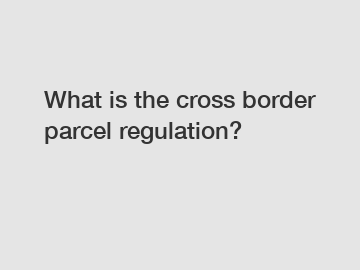What is the cross border parcel regulation?
.
In an era defined by the seamless flow of goods across borders, cross-border parcel regulation plays a pivotal role in fostering international trade. As the global marketplace continues to evolve, it becomes essential to explore and understand the dynamics of this regulatory framework. In this blog, we aim to shed light on what cross-border parcel regulation entails and why it is crucial for the growth of e-commerce in today's interconnected world.
Understanding Cross-Border Parcel Regulation:

Cross-border parcel regulation refers to the set of rules and guidelines that govern the transportation, customs, and delivery processes of packages sent from one country to another. These regulations are put in place to ensure the safe and efficient movement of goods, protect consumer rights, and facilitate the growth of e-commerce on a global scale.
Behind the Scenes: Key Players:
Several stakeholders play a significant role in the implementation and enforcement of cross-border parcel regulation. These include governments, customs authorities, postal services, and private courier companies. Governments establish regulations and oversee compliance, while customs authorities ensure that packages adhere to import and export requirements. Postal services and courier companies act as intermediaries, facilitating the movement and final delivery of parcels across borders.
The Importance of Cross-Border Parcel Regulation:
1. Consumer Protection: Cross-border parcel regulation helps safeguard consumers' rights by ensuring that packages meet safety standards, restricting the movement of counterfeit goods, and facilitating seamless returns and refunds processes.
2. Efficiency and Transparency: Clearly defined regulations contribute to a smoother and more transparent movement of parcels across borders, reducing delays and expediting customs clearance processes. This enhances supply chain efficiency, reducing operational costs for businesses and shortening delivery times for customers.
3. Fair Competition: By regulating cross-border trade, governments can ensure a level playing field, minimizing unfair advantages that might arise from varying regulations in different countries. This promotes fair competition among international businesses and encourages market growth.
4. Revenue Generation: Effective cross-border parcel regulation allows governments to collect appropriate customs duties, taxes, and fees on imports and exports, contributing to national revenue streams.
Implications for E-commerce:
In recent years, the exponential growth of e-commerce has significantly impacted cross-border parcel regulation. The rise in online shopping has created new challenges and opportunities for stakeholders involved.
1. Borderless Marketplaces: E-commerce platforms have transcended physical borders, opening up opportunities for businesses of all sizes to reach a global customer base. Cross-border parcel regulation ensures that these transactions can be conducted smoothly, connecting buyers and sellers across the world.
2. Customs and Duties: E-commerce businesses face the challenge of complying with various customs duties and tax requirements in multiple countries. Cross-border parcel regulation helps streamline these processes, enabling businesses to accurately calculate costs and provide transparency to consumers.
3. Logistics Innovation: As consumer expectations for fast and reliable delivery increase, cross-border parcel regulation serves as a catalyst for innovation in logistics infrastructure. It encourages the development of efficient supply chains, investment in tracking technologies, and collaboration between stakeholders to meet the demands of global e-commerce.
Conclusion:
Cross-border parcel regulation forms the backbone of a globalized e-commerce landscape, fostering trust, transparency, and trade across borders. Effectively navigating these regulations is essential for businesses seeking to expand their reach and provide seamless and secure experiences for customers worldwide. As the e-commerce industry continues to thrive, staying updated with cross-border parcel regulation becomes paramount for businesses and consumers alike. Embracing the opportunities and challenges presented by these regulations will contribute to the sustained growth and development of the global marketplace.
Remember, knowledge is power, and understanding cross-border parcel regulation allows us to participate in an increasingly interconnected world of e-commerce.
For more information, please visit integrate Parcel distribution software, parcel management software dashboard, integrate Logistics Software Development.
197
0
0


Comments
All Comments (0)